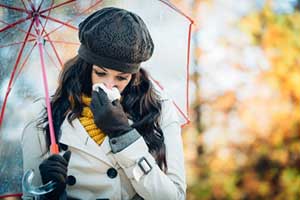Staying Healthy During Allergy Season

Allergies can affect your health in a variety of ways. Doctors sometimes include allergy testing as a part of fibromyalgia and chronic fatigue treatment, and asthma sufferers often experience worsened symptoms during allergy season. If you’re suffering from asthma, allergies, fibromyalgia pain, or chronic fatigue near New York, NY, there are some steps you can take during allergy season that may help reduce your symptoms.
Get Houseplants
Having certain plants in your home may improve your indoor air quality. A peace lily, ficus, bamboo palm, rubber plant, or lady’s palm can absorb and filter airborne toxins, providing you with cleaner air inside your home.
Prepare Produce
If you notice that your mouth and throat feel itchy after eating particular raw fruits, nuts, or vegetables, your reaction may not be caused by the product you’re eating, but by pollens that have contaminated their skin. Before eating, cook or peel your fresh foods to eliminate pollen proteins that may be causing your symptoms.
Supplement Vitamin D
When an individual’s vitamin D levels are too low, they may experience an increased risk of asthma, nasal allergies, and eczema. Absorbable vitamin D3 supplementation may help alleviate allergy symptoms. Check with your doctor before beginning a supplementation regimen to learn where your current vitamin D levels stand.
Exercise Regularly
Moderate intensity exercise may help decrease nasal congestion and lead to reduced symptoms for people who suffer from allergies. Additionally, this type of activity may decrease blood flow to your nasal tissues, which can reduce runniness. To maximize the allergy-fighting benefits of exercise, work out in the late afternoon when the pollen count is typically lowest.
Dehumidify Your Home

Mold and dust mites both thrive and grow in environments that have more moisture. By keeping the air inside your home dry, you can potentially keep these 2 allergy sources under control, which may help reduce your symptoms. To keep your home’s air moisture low, purchase a humidity monitor at your local hardware store and switch on the dehumidifier if levels rise above 50 percent.
– Dr. Dean Mitchell, M.D.
Mitchell Medical Group in NYC & Long Island
About the Author – Dr. Dean Mitchell, M.D.
Dr. Dean Mitchell, M.D. is a Board Certified Allergist and Immunologist based out of NYC. He graduated from the Sackler School of Medicine and completed training at the Robert Cooke Allergy Institute in New York City. He is also a Clinical Assistant Professor at Touro College of Osteopathic Medicine, a fellow of the American Academy of Allergy, Asthma, and Immunology, and the author of Dr. Dean Mitchell’s Allergy and Asthma Solution: The Ultimate Program for Reversing Your Symptoms One Drop at a Time. Dr. Dean Mitchell, M.D. has also been featured in The New York Times, The Huffington Post, Fitness Magazine, Dr. Oz and News NY 1. Dr. Mitchell also hosts the podcast The Smartest Doctor in the Room – a combination of a lively, personal and in-depth interview with top healthcare specialists.

